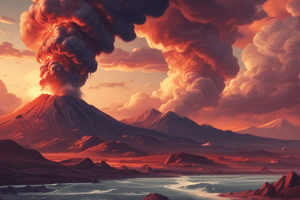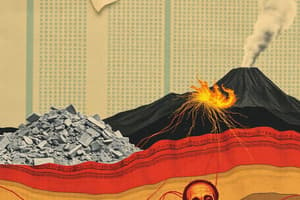Podcast
Questions and Answers
What do volcanoes release to the surface?
What do volcanoes release to the surface?
- Water and sand
- Oil and coal
- Ice and salt
- Lava, rock fragments, and gases (correct)
How do most volcanoes form?
How do most volcanoes form?
- When stars align in the sky
- When tectonic plates collide, move apart, or slide next to each other (correct)
- Due to heavy rainfall
- When mountains erode
What can volcanic eruptions do?
What can volcanic eruptions do?
- Cause earthquakes
- Create rainbows
- Shoot superheated particles over 20 miles high and throw giant boulders in the air (correct)
- Produce snowstorms
Which type of eruption is less dangerous than explosive eruptions?
Which type of eruption is less dangerous than explosive eruptions?
What is covered in a series of videos at Nat Geo Kids?
What is covered in a series of videos at Nat Geo Kids?
Flashcards are hidden until you start studying
Study Notes
- Volcanoes are vents in the earth's crust that release lava, rock fragments, and gases to the surface.
- Most volcanoes form when tectonic plates collide, move apart, or slide next to each other, causing magma to be squeezed out as lava.
- Volcanic eruptions can be extremely explosive, shooting superheated particles over 20 miles high and throwing giant boulders in the air.
- Some volcanoes have effusive eruptions where lava is slowly released to the surface, which are less dangerous than explosive eruptions.
- The text discusses a series of videos at Nat Geo Kids that explain what volcanoes are and how they form.
Studying That Suits You
Use AI to generate personalized quizzes and flashcards to suit your learning preferences.




